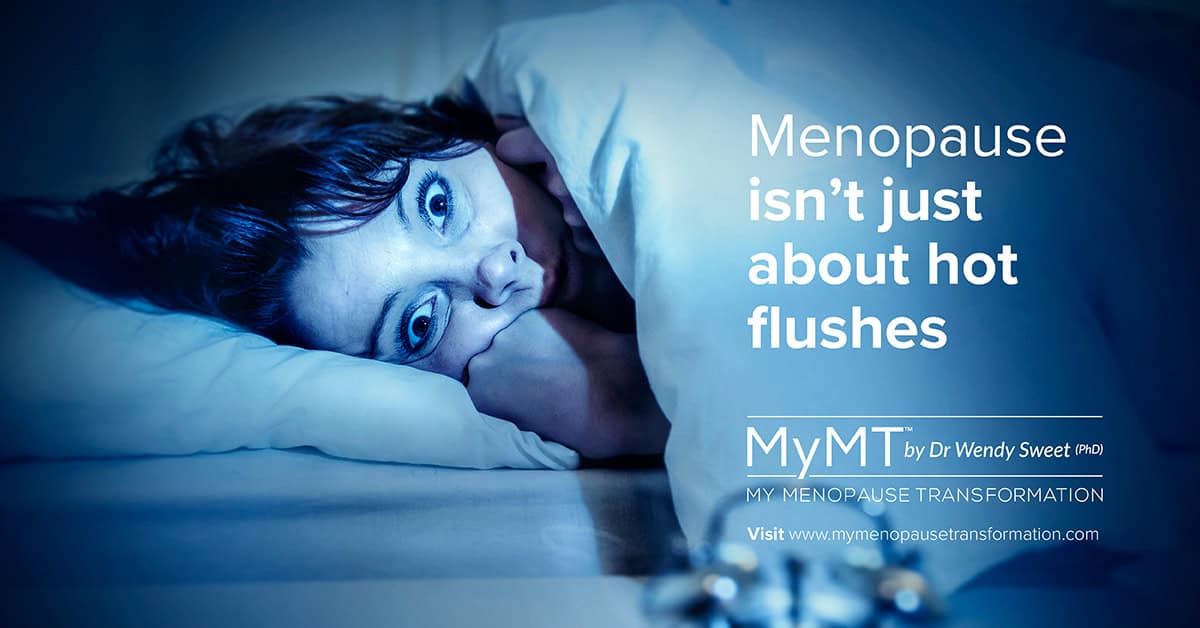There are a number of themes in women’s health research that never get a mention when it comes to discussions on menopause. One of these relates to the work of Sociologist, Anthony Elliott, and his exploration of ‘self’.
I read his work whilst doing my doctoral studies and was fascinated by his exploration about the competing interests between our ‘ideal self’ and our ‘actual self‘ and what factors in our life get in the way of these ideals.
His research has been pivotal in bringing attention to the various societal, cultural and personal influences that shape all of us over the life-course in navigating the construction of ‘self’.
Elliott’s work opened my mind to what was really going on in my life and how I really felt in terms of my healthy ageing. We all have ideal notions about our older-years and how we want to age.
But for many of us, our lack of sleep and other symptoms during menopause get in the way of the ‘ideal’ versus the ‘actual’.
His studies made me reflect on the need to take action before it was too late to turn-around my health and it needed to start with sleeping all night.
When it comes to our healthy ageing, a good nights sleep is the foundation.
For millions of women, not sleeping during their menopause transition, sends them spiraling into more health chaos as they age. Sleep is the foundation for our healthy ageing.
Not sleeping due to insomnia leads to ongoing inflammation in our muscles, joints, pancreas and heart. It’s partly why women end up with sore joints, aching muscles, more hot flushes and feeling bad tempered too.
Insomnia is defined by the US National Institutes of Health (NIH) as “the perception or complaint of inadequate or poor-quality sleep”. Characteristics include –
- difficulty falling asleep
- waking up frequently during the night with difficulty returning to sleep
- waking up too early in the morning
- un-refreshing sleep.
Unfortunately, many of these characteristics have become normalised for people the world over – including women in menopause and post-menopause.
But here’s the thing. Menopause is not the issue. All women go through this life-stage.
As I often say to women, “Menopause is the biological gateway to our ageing. The issue with our symptoms is that we have been forgotten about in terms of understanding how to change our lifestyle to allow our body to accommodate hormonal changes as we move through mid-life.”
Un-raveling the science of not sleeping specific to our menopause transition, took me hundreds of hours of study, but I was so determined to understand why I wasn’t sleeping, despite the endless supplements and medications.
Nobody told me it was all to do with the clash between my changing hormones in menopause and the lifestyle I was still trying to lead whilst my hormones were changing.
Getting deep, restorative sleep (between 2-4am), is also important to reduce our night sweats as well. When we sleep more deeply, blood flow is directed less toward the brain, which cools measurably. Temperature regulation mechanisms are situated in the brain too.
But the main thing about our deep sleep is that during this time of the night, the pituitary gland releases a pulse of growth hormone that stimulates tissue growth and muscle repair.
That’s why, when we are lying awake between 2 and 4am, this release of growth hormone does not reach the threshold it needs to for healing and repairing our body, including healing our gut, liver, muscles and joints overnight.
New research suggests that our sleep is even more important to our muscles and bones as we age, than we think. (Juliana, Azmi et al, 2023). Whilst the emphasis is often on the 24 hour day-night circadian clock, this new evidence reports that our muscles and bones also function on a 24 hour day-night circadian pattern.
When this circadian pattern is disturbed through insomnia, shift work, menopause hormonal changes or incorrect exercise and nutrition timing, then muscle and bone dysfunction may occur.
If you are experiencing restless leg syndrome, sore joints, poor bone health or fibromyalgia and you aren’t sleeping, then you will know what I mean.
Furthermore, this dysfunction of the skeletal and muscle circadian clock can also interfere with fat and glucose metabolism, thus contributing to any weight gain you may be experiencing too.
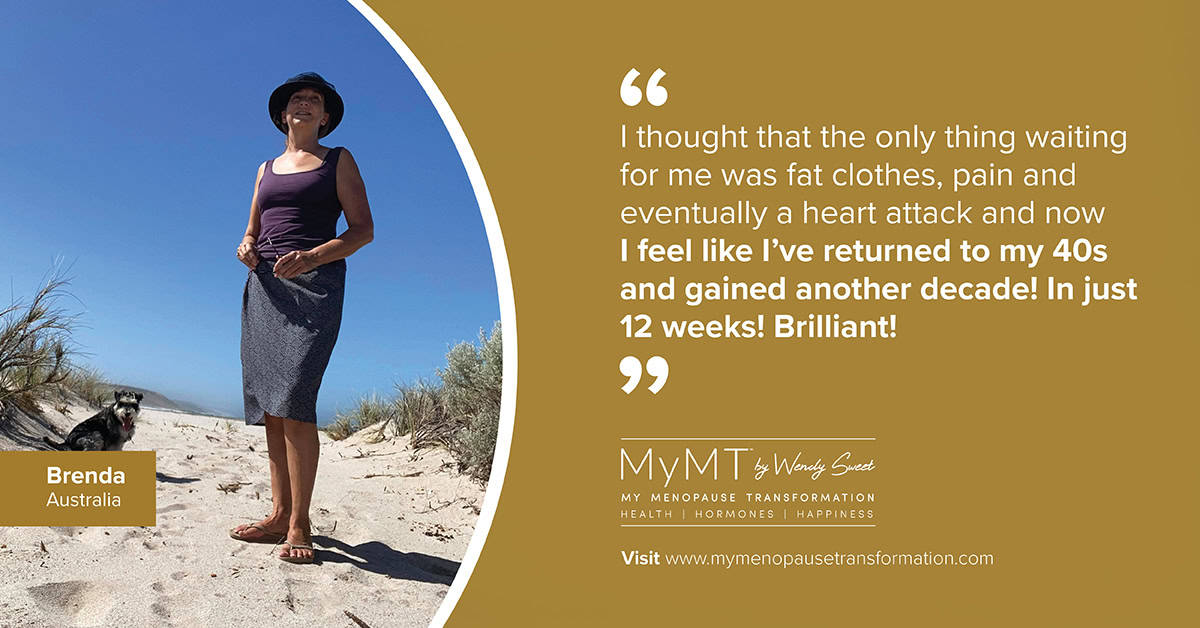
Not sleeping well raises both insulin (blood sugar hormone) and cortisol (stress) hormones:
This powerful combination of high insulin and high cortisol competes with your sleep hormone, called melatonin.
If your insulin levels remain higher than normal in the evening and/or your stress levels are high prior to bedtime, then this can cause disruption to the production of melatonin – your precious sleep hormone. In the evening, your melatonin levels need to be as high as possible.
If melatonin levels are low, then the less deep sleep you have and you wake-up more frequently overnight.
And we all know what waking up in the night means don’t we?! The more awake you feel, the busier your brain and the more hot flushes you have …. night after night … and over time, your brain and your hormones are now reading this as your ‘new normal’.
As many of you already know – the result is daily fatigue, exhaustion, irritability, anxiety and with your insulin levels all mixed up overnight, the weight starts to increase around the belly too. Lack of sufficient sleep disrupts hormones that control hunger and appetite. Furthermore, those feelings of daytime fatigue, can also lower your motivation for exercise and healthy eating.
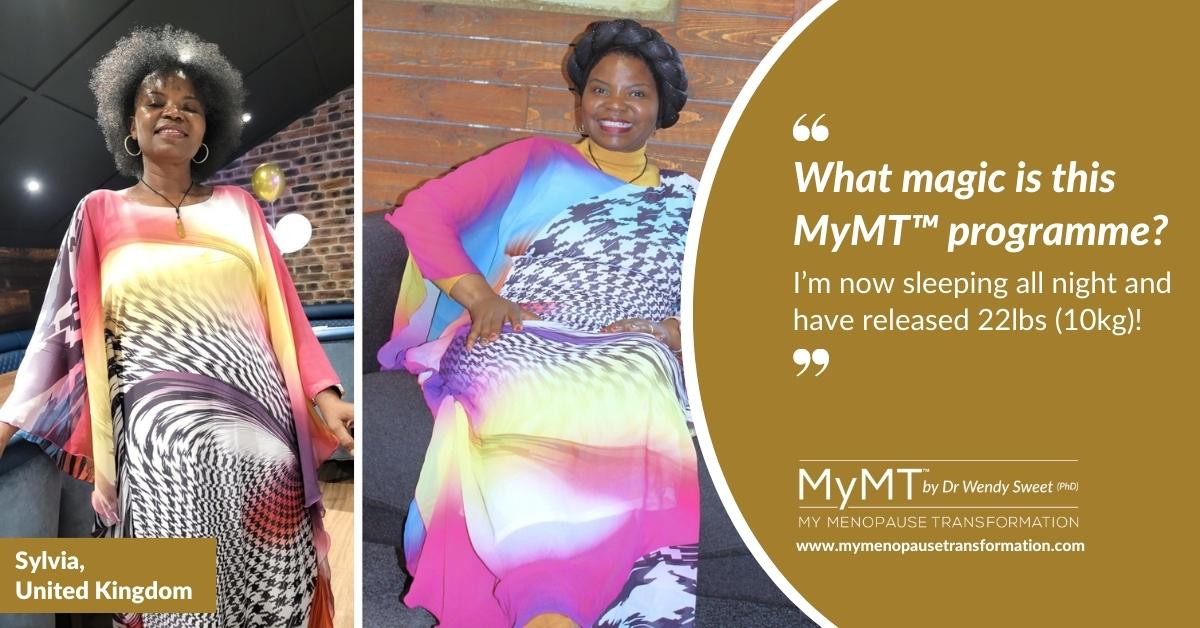
If you are struggling with your sleep, then please don’t despair! Because I want to share with you my 3 top reasons why you aren’t sleeping in menopause.
- Your Circadian Rhythm is out of balance. The term ‘Circadian’ means “about a day” so our circadian rhythms are daily fluctuations in our biology that can become messed up as we transition through menopause. This internal clock, which gradually becomes established during the first months of life, controls the daily ups and downs of biological patterns, including body temperature, blood pressure, and the release of hormones. That’s why in the MyMT ‘Transform Me’ weight loss programme and the MyMT Circuit Breaker symptom-reduction programme, the first module you listen to is simply called ‘Sleep All Night’.
Our changing menopause hormones cause disruption to our normal circadian rhythms, and as such, many of our organs also get out of this synchronised pattern.
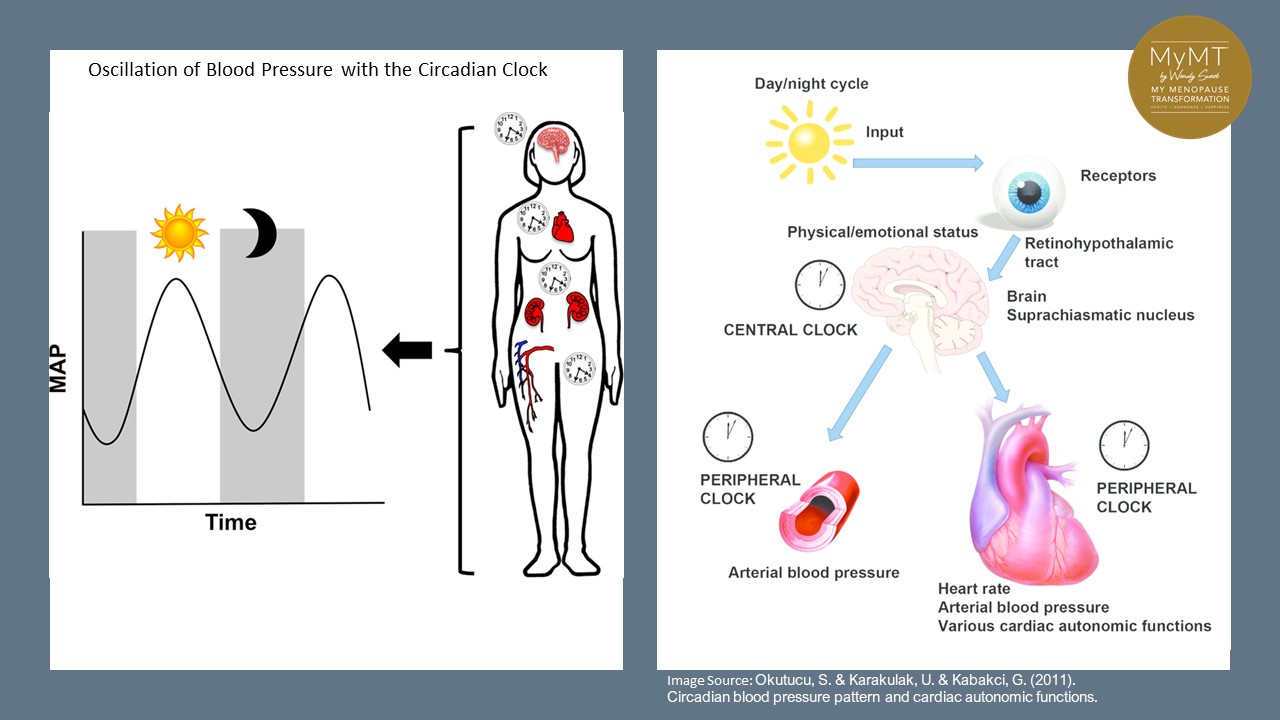
2. Not sleeping can cause your thyroid hormones to get out of balance. Because of the powerful link between your pituitary hormones in your brain and your thyroid hormones, and because hormones in the body all work in harmony with each other, when your reproductive hormones change as you go into menopause, your other hormones start to adjust to re-balance the body. This includes your thyroid hormones that control your blood pressure, heat regulation, stress levels and moods. It’s why, when you address your circadian rhythm and you ensure that you get adequate iodine and folate in your diet, from leafy greens, fish, salmon, seaweed products and other food sources, your thyroid re-balances too.
Iodine-rich foods help to balance your thyroid.
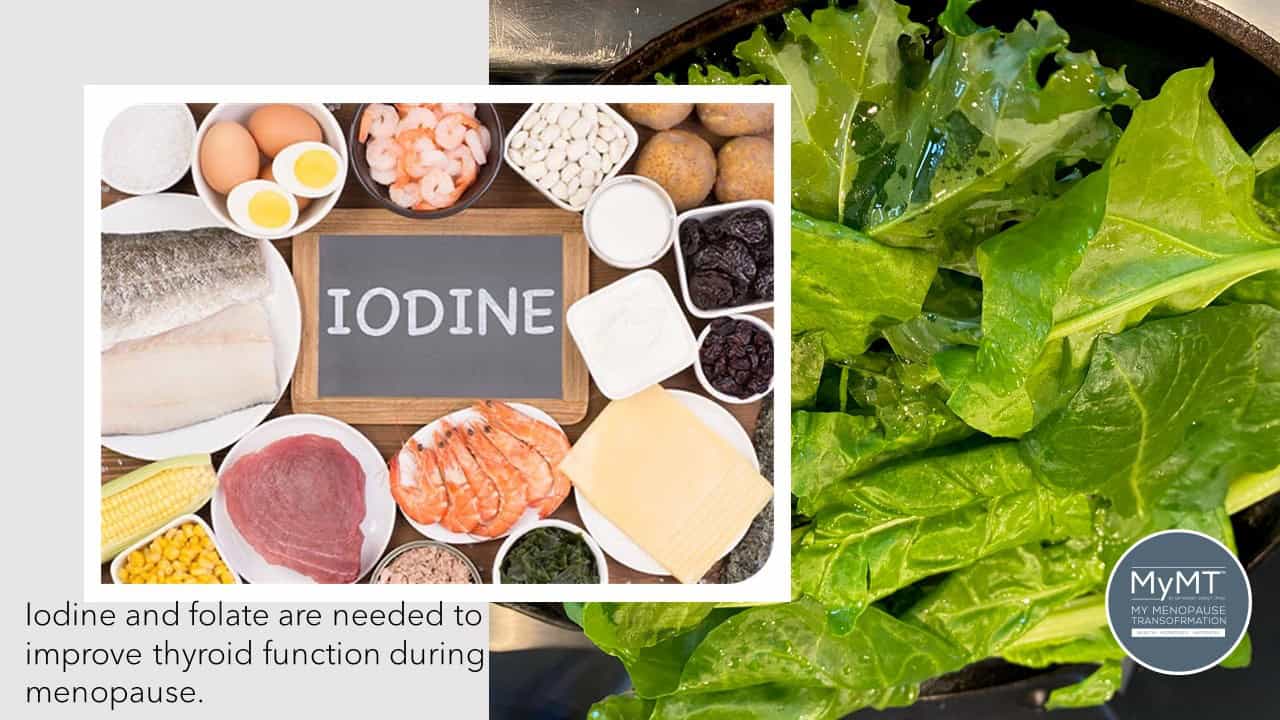
3. Inflammation builds up during peri-menopause, including in our nervous system. This is why many of you feel anxious, get palpitations and feel ‘wired’ and can’t sleep.
As I mention in my online Masterclass on Menopause, when we have been waking up night after night, then our brain and body reads this as our ‘new normal’. But this is what leads us down the path towards the build-up of inflammation in our cells and tissues.
Not sleeping is now recognised as one of the main contributing factors to changing health as we move into our post-menopause years and for women going into post-menopause, the concern is the rising statistics for heart disease.
The United Kingdom, Australia and New Zealand have some of the highest incidence of post-menopause heart disease globally. America is up there too.
But here’s the thing – if we aren’t sleeping, our heart and immune system stay under stress all day long, particularly, when we are regular exercisers or we have busy, stressful jobs or home environments.
This causes more inflammation in cells and tissues and in ageing research, is known as oxidative stress or ‘inflammaging‘.
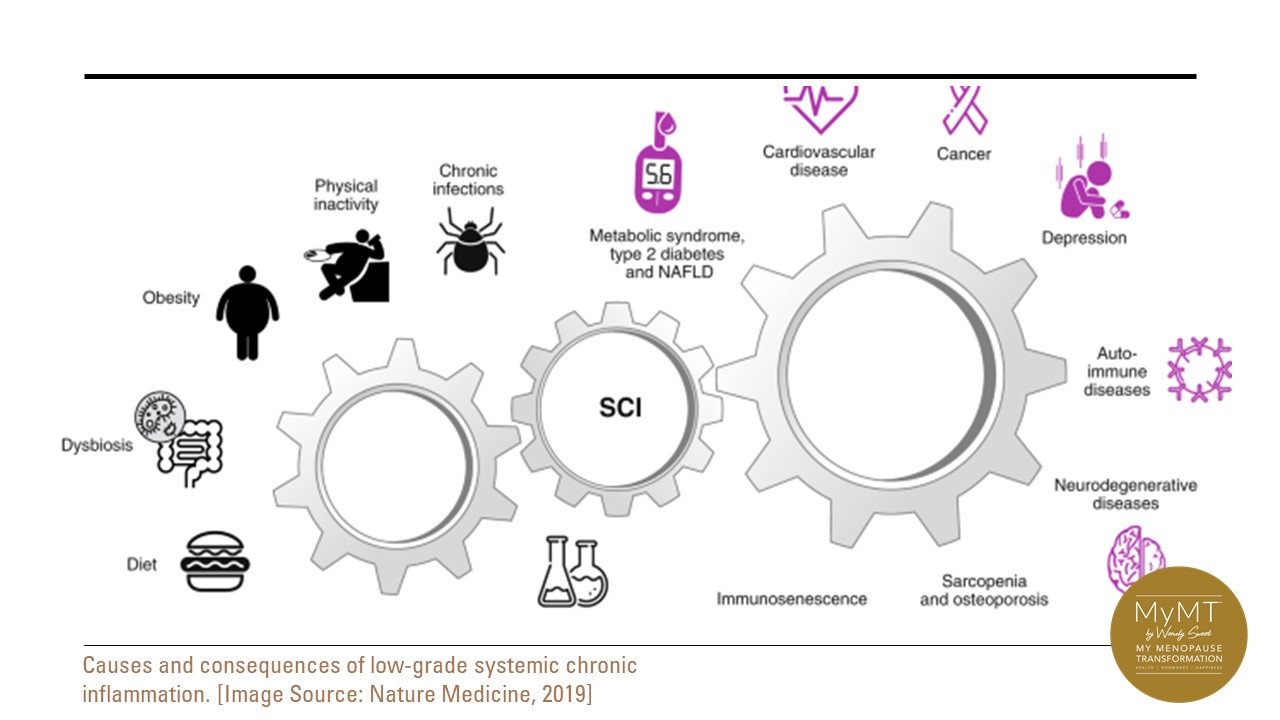
When I began to look into our menopause symptoms as part of my women’s healthy ageing studies, I began to understand that our menopause transition is a natural transition that all women go through. But for millions of women, this stage of their lives can result in all sorts of mayhem.
This starts with not sleeping well.
With another 20-30 years of living ahead of us, I am passionate that women turn around their sleep, weight and other symptoms as they go through menopause.
How to achieve this as well as learning how to restore your liver health, change your nutrition to suit your menopause transition and improve your energy, is all in two fabulous 12 week online step-by-step coaching programmes that you do in your time, at your pace, with my support.
If you want to start with understanding what is happening in menopause, then perhaps commence with my 2 hr webinar which I’ve called your Masterclass on Menopause.
There is only a small charge of NZ$15 (approx. AUS$14 or UK£7.5) for this as I host you in my private member area. And yes, despite it being 2 hours long, you can ‘pause’ me any time you like. I tell you about it in the short video below.
Thank you for joining me in the MyMT™ newsletter community. It’s great to have you here with me.
Dr Wendy Sweet (PhD) – read my story here.
References:
Calhoun DA, Harding SM. Sleep and hypertension. Chest. 2010 Aug;138(2):434-43. doi: 10.1378/chest.09-2954.
Davis, S., Castelo-Branco, C. et.al. (2012). Understanding weight gain at menopause. Climacteric, 15: 419–429.
Geddes, L. (2019). Chasing the Sun: The new science of sunlight and how it shapes our bodies and minds. London: Profile Books.
Harvard Health Report (2017). Improving Sleep. Harvard Health Publication
Juliana N, Azmi L, Effendy NM, Mohd Fahmi Teng NI, Abu IF, Abu Bakar NN, Azmani S, Yazit NAA, Kadiman S, Das S. Effect of Circadian Rhythm Disturbance on the Human Musculoskeletal System and the Importance of Nutritional Strategies. Nutrients. 2023; 15(3):734. https://doi.org/10.3390/nu15030734
Lee J, Han Y, Cho HH, Kim MR. Sleep Disorders and Menopause. J Menopausal Med. 2019 Aug;25(2):83-87. doi: 10.6118/jmm.19192. Epub 2019 Aug 5. Erratum in: J Menopausal Med. 2019 Dec;25(3):172.
Neroni B, Evangelisti M, Radocchia G, Di Nardo G, Pantanella F, Villa MP, Schippa S. Relationship between sleep disorders and gut dysbiosis: what affects what? Sleep Med. 2021 Nov;87:1-7. doi: 10.1016/j.sleep.2021.08.003.
Reinke H. & Asher G. (2017). Circadian clock control of liver metabolic functions. Gastroenterology, 150: 574–580.
Rizzi, M. et al. (2016). Sleep Disorders in Fibromyalgia Syndrome. Journal of Pain Relief, 5:2, 1-5
Sharma, S. & Kavuru, M. (2010). Sleep and Metabolism: An Overview. Int. Journal of Endocrinology, Article ID 270832, 1-12.
Woods, N. et al. (2009). Cortisol Levels during the Menopausal Transition and Early Postmenopause: Observations from the Seattle Midlife Women’s Health Study. Menopause, 16(4): 708–718.
